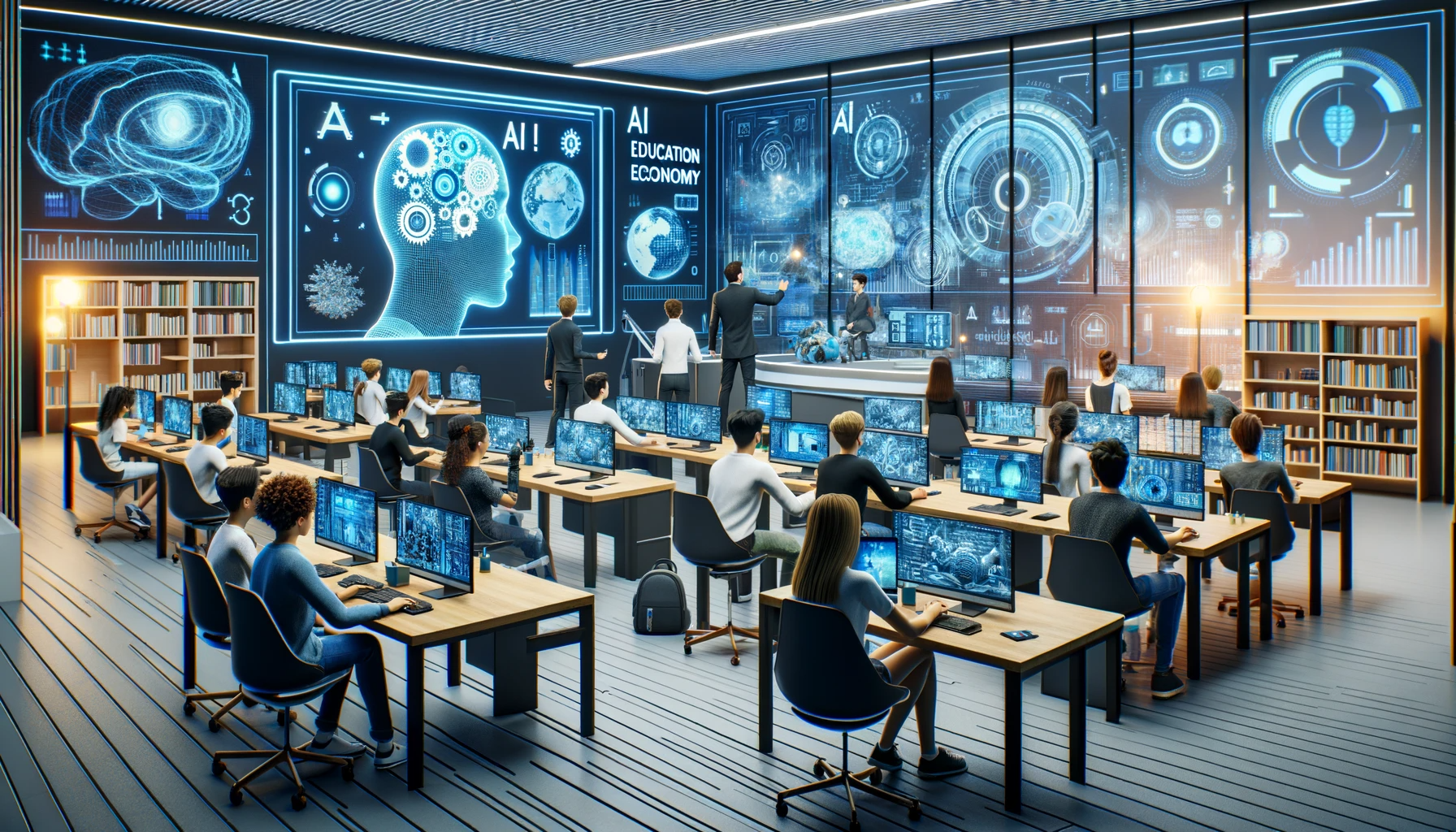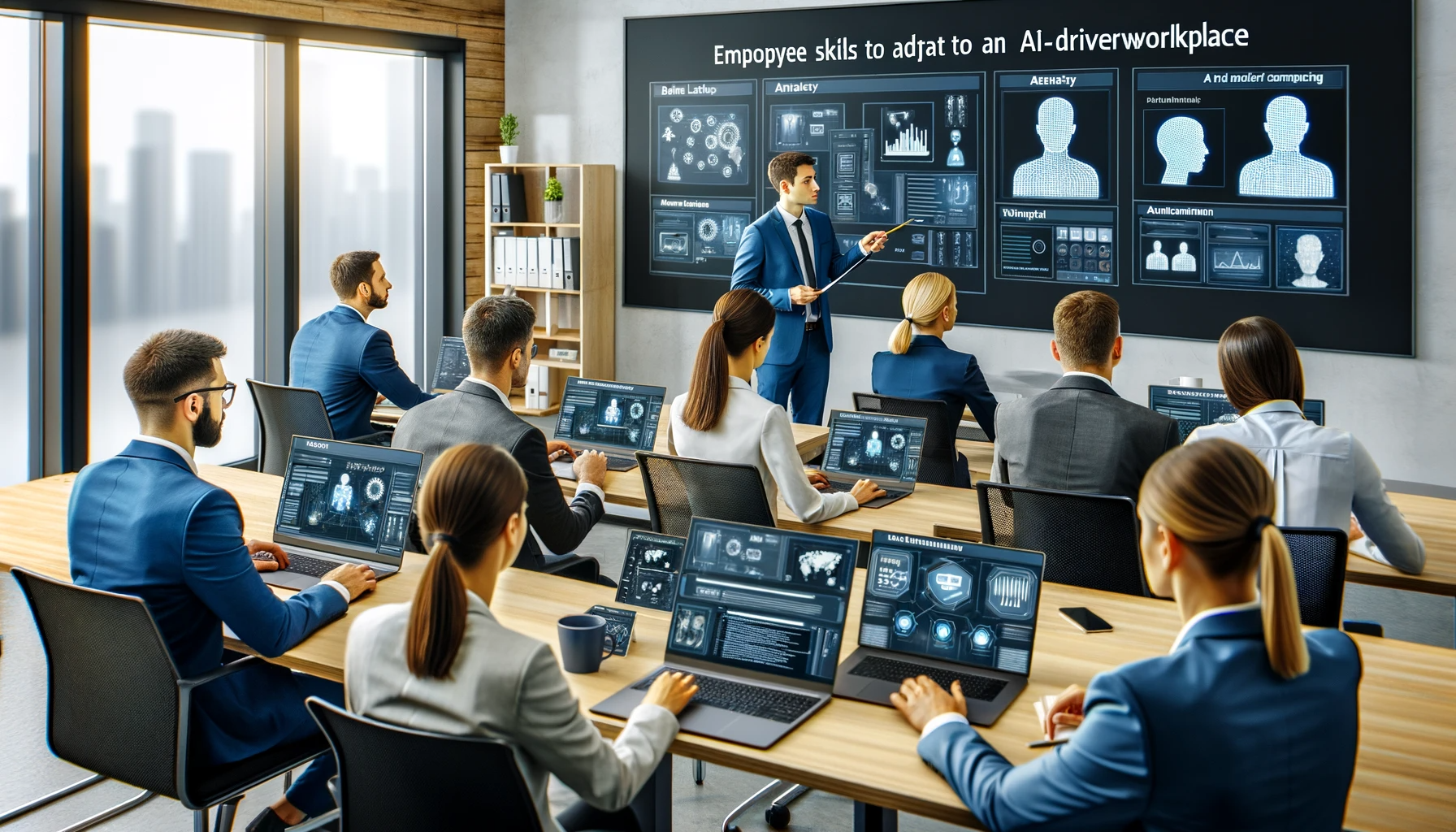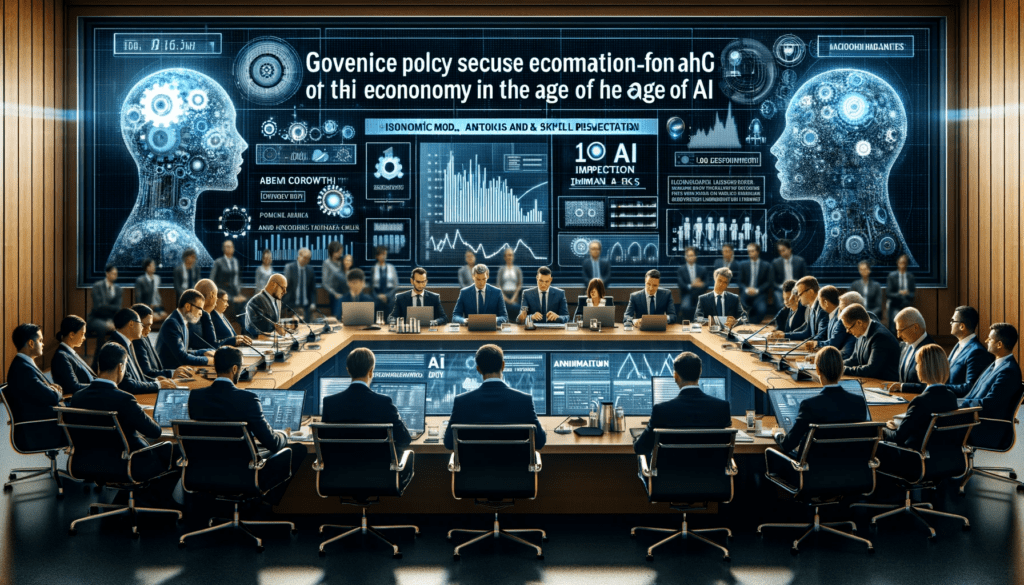In recent years, we have witnessed a remarkable transformation in the global economic landscape, one that is fundamentally altering the way we work, produce, and trade. At the heart of this transformation lies the integration of artificial intelligence (AI) and automation into the very fabric of our economies. This phenomenon has given rise to what is now commonly referred to as an “AI-driven economy.”
The AI-driven economy is characterized by the pervasive influence of AI and automation technologies across a wide spectrum of industries and sectors. From manufacturing and healthcare to finance and transportation, AI has become a driving force behind productivity gains, cost efficiencies, and innovative breakthroughs. Automation, powered by AI algorithms, is reshaping labor markets by taking on routine and repetitive tasks, leaving humans to focus on higher-value, creative, and strategic endeavors.
As we navigate this era of unprecedented technological advancement, a central question looms large: How can our economies and labor markets adapt to this transformation? While the promise of AI-driven growth and prosperity is evident, it brings with it a host of challenges and uncertainties. The profound changes in the nature of work, the potential for job displacement, and the ethical implications of AI require thoughtful consideration and proactive measures.
In this article, we embark on a journey to explore the multifaceted dimensions of the AI-driven economy. We will delve into the impact of AI on jobs, the imperative of reskilling and upskilling, the role of AI in economic growth, the necessity of policy and regulation, the power of entrepreneurship and innovation, the transformation of education, the importance of international collaboration, and the challenges and concerns that lie ahead. Ultimately, we seek to unravel how societies can best prepare for an AI-driven future and ensure that the benefits of this transformation are shared equitably.
The Impact of AI on Jobs
The rapid advancement of AI and automation technologies has sparked considerable debate regarding their potential impact on employment. While these technologies hold the promise of increased productivity and efficiency, they also raise concerns about job displacement.
One of the most discussed aspects of AI’s impact on employment is the potential for automation to replace certain job roles. Industries that rely heavily on routine, repetitive tasks are particularly susceptible to automation. For instance, manufacturing and assembly line jobs, data entry, and customer service roles can be automated to a significant extent. According to various studies, up to 30% of existing jobs across various industries could be automated in the coming years.

Reskilling and Upskilling
In an AI-driven economy, the importance of reskilling and upskilling the workforce cannot be overstated. As automation takes over routine tasks, there is a growing need for workers to acquire new skills that complement AI technologies.
Reskilling and upskilling initiatives are critical for ensuring that individuals are prepared for AI-related jobs. Many organizations and governments have recognized this need and are investing in programs designed to provide workers with the skills required in the AI era. For example, online learning platforms offer courses in data science, machine learning, and programming, enabling individuals to acquire valuable AI-related skills from the comfort of their homes.
AI and Economic Growth
The integration of AI into various industries has the potential to drive substantial economic growth and foster innovation. AI technologies offer opportunities for increased productivity, cost savings, and enhanced competitiveness.
One of the key ways AI contributes to economic growth is through improved productivity. AI-powered automation can streamline processes, reduce errors, and increase efficiency across industries. For example, in manufacturing, AI-driven robots can work alongside human employees to perform tasks more quickly and accurately. This not only reduces costs but also leads to higher output and overall economic growth.
Furthermore, AI has the capacity to drive innovation by enabling the development of new products and services. For instance, in healthcare, AI-powered diagnostic tools can improve patient care and lead to the creation of innovative treatments. Similarly, in finance, AI-driven algorithms can optimize investment strategies and create new financial products.
Several countries and industries are already reaping the economic benefits of AI adoption. For example, countries like the United States and China are leading in AI development and have witnessed substantial economic growth in AI-related sectors. Industries such as tech, healthcare, finance, and manufacturing have embraced AI to enhance their operations and remain competitive in the global market.
This section will delve into the ways AI contributes to economic growth and innovation, providing real-world examples of industries and countries that have harnessed the power of AI to achieve economic benefits.
Policy and Regulation
While AI presents numerous opportunities, it also raises important ethical considerations, privacy concerns, and questions of accountability. In an AI-driven economy, there is a pressing need for comprehensive policies and regulations to ensure responsible AI use.
Ethical considerations in AI involve issues such as bias in algorithms, transparency, and fairness. For instance, AI systems that make decisions about hiring or lending must be free from discriminatory biases. Privacy concerns arise when AI technologies collect and analyze vast amounts of personal data. Additionally, the question of accountability becomes crucial when AI systems are involved in critical decision-making processes.
Several countries have recognized the need for AI governance frameworks and have taken steps to address these issues. For example, the European Union’s General Data Protection Regulation (GDPR) includes provisions related to AI and data privacy. Countries like Canada and Singapore have also developed AI ethics guidelines and regulations.
This section will explore the necessity of policies and regulations in the AI-driven economy, discussing the ethical considerations, privacy concerns, and accountability issues that must be addressed. It will highlight examples of countries that have implemented AI governance frameworks and the impact of these regulations on the responsible use of AI.
Entrepreneurship and Innovation
Entrepreneurship plays a vital role in driving innovation and economic growth in the AI-driven economy. Startups and small businesses are uniquely positioned to leverage AI technologies to create innovative solutions and disrupt traditional industries.
The democratization of AI tools and resources has lowered the barriers to entry for entrepreneurs. AI-powered services and platforms are increasingly accessible, enabling startups to incorporate AI into their products and services. For example, AI chatbots, recommendation engines, and predictive analytics are used by startups to enhance customer experiences and optimize operations.
Successful AI-driven startups have emerged across various sectors. For instance, in the healthcare industry, startups are developing AI-powered diagnostic tools and personalized treatment recommendations. In the e-commerce sector, AI-driven recommendation engines are improving product discovery and customer engagement. These innovative startups not only bring new solutions to market but also create jobs and stimulate economic growth.
Statistics and research findings offer insights into the changing job landscape. For instance, a report by the World Economic Forum estimates that by 2025, the division of labor between humans and machines in the workplace will shift, with machines handling more current work tasks than humans. Additionally, the McKinsey Global Institute suggests that while automation may lead to job displacement in the short term, it could also create new job opportunities in the long run.
Preparing the Education System
The advent of the AI-driven economy necessitates a transformation in the education system to equip students with the skills and knowledge needed for the workforce of the future. The traditional model of education is evolving to meet the demands of AI-related industries.
One key aspect of this transformation is the emphasis on AI literacy in schools and universities. AI literacy encompasses not only technical skills but also an understanding of AI’s impact on society, ethics, and critical thinking. Educational institutions are incorporating AI-related coursework and programs into their curricula to ensure that students are well-prepared for AI-driven careers.
For example, universities are offering AI-focused degrees and courses in fields such as data science, machine learning, and AI ethics. In K-12 education, coding and AI-related concepts are being introduced to students at an earlier age. This shift in education aims to create a workforce that is not only proficient in AI technologies but also capable of ethical and responsible AI use.
Furthermore, numerous AI education initiatives have emerged to bridge the skills gap and prepare individuals for AI-related careers. These initiatives include online courses, coding bootcamps, and AI education platforms. They provide accessible and flexible learning opportunities for individuals seeking to acquire AI skills.
International Collaboration
In an increasingly interconnected world, the transition to an AI-driven economy requires international collaboration and cooperation. AI-related challenges and opportunities are not confined to national borders, making global partnerships essential.
International collaboration in adapting to the AI-driven economy involves knowledge sharing, research collaborations, and joint initiatives. Countries and organizations are working together to pool resources and expertise to address common challenges and seize opportunities.
For instance, research institutions and universities engage in cross-border collaborations to advance AI research. These collaborations facilitate the exchange of ideas, data, and best practices. Additionally, countries are entering into agreements to promote AI development and cooperation in areas such as AI ethics and standards.
Case studies of cross-border AI projects and initiatives highlight the benefits of international collaboration. For example, joint research efforts between universities from different countries have led to breakthroughs in AI technologies. Collaborative efforts to address global challenges, such as climate change, may involve AI-powered solutions that benefit all nations.
Challenges and Concerns
While the AI-driven economy presents promising opportunities, it also raises significant challenges and concerns that must be addressed. It is essential to acknowledge and tackle these issues to ensure a smooth transition.
One of the primary challenges is job displacement due to automation and AI. As AI technologies automate routine tasks, some jobs may become obsolete, potentially leading to unemployment and economic inequality. Policymakers and industries must develop strategies to reskill and upskill the workforce to adapt to the changing job landscape.
Inequality is another concern, as AI technologies may exacerbate existing disparities. Access to AI-related education, employment opportunities, and AI tools may be unequal, leading to a digital divide. Efforts to ensure equitable access to AI benefits are essential.
Ethical dilemmas also arise, particularly regarding AI ethics, bias, and accountability. AI systems are not immune to biases present in data and algorithms, which can lead to discriminatory outcomes. Ensuring transparency, fairness, and ethical use of AI is a critical concern.
Preparing for the Future
As we peer into the horizon of an AI-driven world, it’s abundantly clear that our economies and societies are poised for profound transformations. The relentless pace of technological advancement, with no indication of deceleration, ensures that AI will increasingly take center stage in shaping our future.
In this section, we venture into the realm of speculation, contemplating the future of economies within an AI-driven landscape. We are on the cusp of witnessing remarkable advancements in AI technology, each carrying profound implications for various industries. The range of possibilities is staggering. Imagine AI-powered healthcare systems that not only excel in diagnosis but also revolutionize the treatment of diseases through personalized medicine. Picture AI-driven sustainable practices in agriculture that optimize crop yields, reduce resource consumption, and play a pivotal role in mitigating the effects of climate change.
In our vision of the future, the very landscape of work and society is set to undergo a metamorphosis. Traditional notions of employment, linear career paths, and static education systems will no longer suffice. Lifelong learning, adaptability, and AI literacy will be indispensable for individuals to thrive in this new era. The workforce will need to continuously update and expand their skills, and organizations will need to foster a culture of innovation and adaptability.
The future holds both exhilarating possibilities and uncharted challenges. It beckons us to embrace change, to cultivate a spirit of innovation, and to approach AI with a sense of responsibility. It is a future where human potential converges with the boundless capabilities of AI, forging a path toward unprecedented progress and societal transformation. As we step into this era, we must do so with eyes wide open, guided by a commitment to harness the power of AI for the betterment of all. The future is ours to shape, and with wisdom and determination, we can navigate the uncharted territory of an AI-driven world.

Conclusion
In conclusion, the rise of AI and automation is fundamentally reshaping our economies and labor markets. The transformative potential of AI is both promising and challenging. As we navigate this profound shift, it’s essential to keep several key takeaways in mind.
Firstly, proactive adaptation is paramount. Individuals, organizations, and governments must invest in reskilling and upskilling efforts to prepare the workforce for AI-related jobs. Embracing lifelong learning and fostering an environment of continuous education will be crucial.
Secondly, addressing ethical concerns and ensuring responsible AI development is non-negotiable. As AI becomes more integrated into our lives, we must prioritize transparency, fairness, and accountability in AI systems to mitigate biases and discrimination.
Lastly, collaboration on a global scale is necessary. International partnerships, knowledge sharing, and research collaborations are essential to tackle the challenges and harness the opportunities presented by the AI-driven economy.
The future is both exciting and uncertain, but with careful planning, proactive adaptation, and ethical considerations, we can shape a sustainable and equitable future in the era of AI. Individuals, governments, and organizations all have a role to play in this transformative journey.
